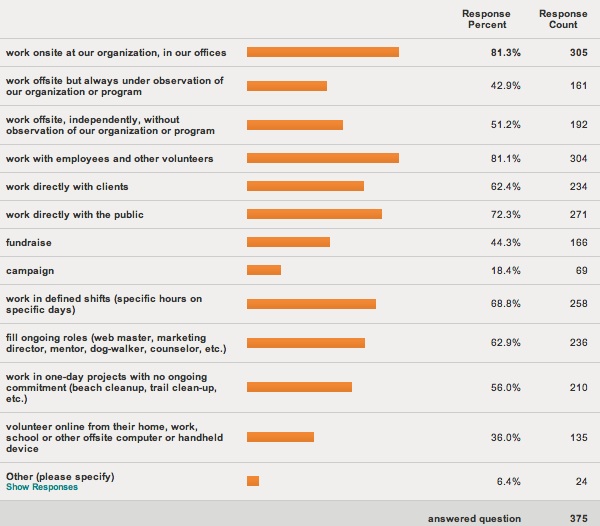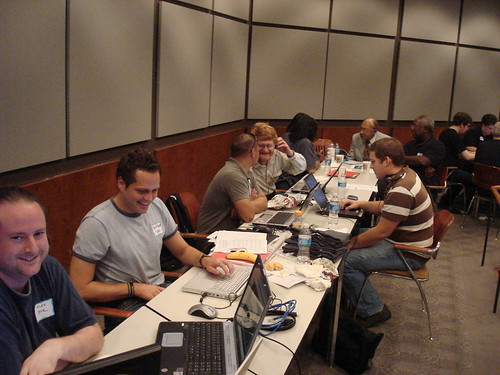A marketing director is defined by the scope of his or her responsibilities – not a pay rate. Paid or not, you call such a person a marketing director.
An executive director is defined by the scope of his or her responsibilities – not a pay rate. Paid or not, you call such a person an executive director.
A firefighter is defined by the scope of his or her responsibilities and training – not a pay rate. Volunteers can be – and often are – firefighters, despite what the union of professional firefighters wants you to believe.
Often, the term volunteer really is just a pay rate, not a job title. If someone has responsibilities on behalf of an organization, but isn’t paid, he or she is a volunteer. Yet a lot of people have a problem with that label as a classification, like these interns who are upset about not being paid. Call them volunteers, and they have a minor freak out. But that’s what they are – they are volunteers, because they aren’t paid.
The debate should be this: SHOULD interns be volunteers?
What these unpaid interns that are so upset about being labeled volunteers don’t seem to get is that I’m actually on their side: I think they should be paid. They should be employees or short-term consultants, no question. Why? Because
May internships be unpaid? Sure! But there must be a stated reason that is not “because we don’t have money to pay them.” That’s just pure exploitation, period.
I worked at a certain very large international NGO that shall remain nameless that was involving unpaid interns in large numbers – and I felt it was incredibly exploitative: nothing was in writing, and people held unpaid internships for months and months for no dicernable reason other than that they were free labor and so desperate for the experience that they made no demands. I didn’t have the power to change the intern policy throughout the organization, but I did for my own department. And here’s the parameters I established that all staff in our department had to adhere to regarding involving unpaid interns:
- An internship had to have a primary focus on giving the intern a learning experience, not getting tasks done. Therefore:
- There had to be a written job description that reflected this primary purpose of the internship.
- The intern was invited to all agency-wide staff meetings, all staff meetings for just our department, and encouraged to ask to attend staff meetings for other departments, to learn about work across the agency. Staff were encouraged to take interns with them to meetings or events whenever possible, as appropriate.
- The intern also had one project that was uniquely his or hers, that he or she was responsible for and could put on his or her résumé (for instance, conducting a survey, or evaluating some process and making recommendations for improvement).
- The intern received job coaching and job search help by other staff members.
- A person chosen for the internship had to be able to say why they wanted to enter into a profession related to our agency’s work, and say what they had done up to that point, in terms of education, volunteer work and paid work, to pursue that career choice.
- A person could hold an internship only for up to six months. They absolutely could not hold it beyond six months, no exceptions. An intern could NOT return to our department as an intern again, ever. That reduced the chance of a person being exploited as free labor; it forced rotation in what was supposed to be a role reserved for people learning about our work, not the opportunity for someone to have an unpaid assistant indefinitely.
- Ideally, the intern that was leaving would overlap with the intern that was coming in by one week, so that the departing intern could get experience training someone, documenting his or her responsibilities, etc.
- When the intern left, he or she was interviewed about his or her experience as an intern from the point of view of getting the learning and professional development he or she was looking for, and this was used to continually improve internship involvement and to show if interns were getting what our internship promised: a learning experience.
The primary task we reserved for interns was answering the many, many emails that came in regarding an online program by our agency. We found that interns really were the best people for this task: in contrast to giving this task to employees, interns brought freshness and enthusiasm to responses that really shown through. They quickly saw patterns in questions or comments that a burned out staff person might not see, leading to adjustments to web site information and other communications. Also, in my opinion, because the interns were volunteers, they assumed a much stronger customer-advocate point-of-view regarding the people emailing with questions or comments than employees did; the agency could have a real seige-mentality outlook when dealing with anyone outside the organization, while the interns had a mentality of being advocates for those outside the organization.
As I mentioned, I also came up with tasks specifically for an intern to own. It might be an internal staff survey, a customer/client survey, a research project, an evaluation/analysis project, production of a report or online resource, etc. Every intern walked away something that was his or hers, a project that he or her directed or managed or lead, and that employees and other interns contributed to. That gave interns the management experience so many were desperate for.
The problem with having these internships as unpaid: it meant that anyone who couldn’t afford to move to our geographic area and work at least 20 hours a week, unpaid, couldn’t be an intern. That excluded a lot of qualified people. It meant all of our interns were from the USA or Europe. It meant qualified people who couldn’t afford to volunteer (work unpaid) couldn’t be interns. I tried creating online internships specifically for these people, but sadly, we never got qualified candidates to apply for those – though I’ve wondered if there was just too much skepticism about an online internship being a real internship – perhaps it would be easier now.
One last note: yes, I’ve been an intern. I had a summer-long internship at a for-profit newspaper between my sophomore and junior year at university, and I was paid – and it met almost all of the parameters I think an internship should have, paid or not, that I’ve outlined above. I had a year-long internship during senior at my university, at a nonprofit arts center, and I was paid and, again, the role met almost all of the parameters I think an internship should have, paid or not, that I’ve outlined above. My last internship was a summer-long gig after I graduated, at a nonprofit theater, and I was not paid – but, indeed, the role met almost all of the parameters I think an internship should have, paid or not, that I’ve outlined above. None of those internships guaranteed me eventual employment, but they all did end up helping me get the experience and networks I needed for eventual full-time employment. All three organizations, including the for-profit company, looked at their intern involvement as a way of giving back, of cultivating young people into specific professions.
The newspaper paid me because it had to; as a for-profit business, it couldn’t involve unpaid staff. The nonprofit arts organization paid me because they could; they got a grant from the state to do so. The theater didn’t pay me because felt they were offering young people free education and a potential job connection network that aspiring actors, production staff and administration staff couldn’t buy if they had wanted to – not kidding! There was also this you-have-to-survive-this-trial-by-fire-to-work-in-theater attitude that those of us who did survive such wore like a badge of honor. I look back on that experience and, as much as I want to say I was exploited… I do feel like I got experience and connections I could never have gotten otherwise, that the organization really did do me a favor.
Also see:
This article in the New York Times about interns.
Internship Programs Under The Fair Labor Standards Act (USA)
This PDF fact sheet provides general information to help determine whether interns must be paid the minimum wage and overtime under the Fair Labor Standards Act in the USA
Social Inequity and the Unpaid Intern
The blog unfairinternships.wordpress.com






